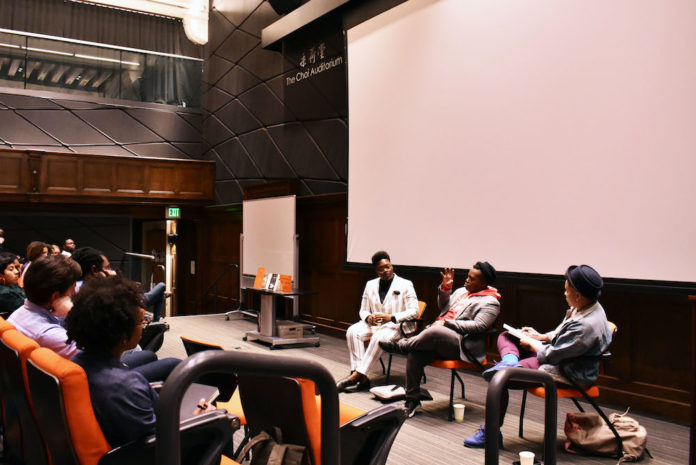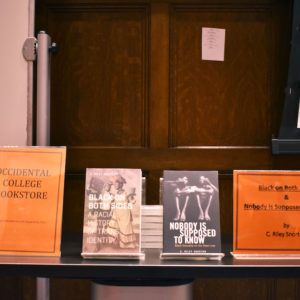
C. Riley Snorton, professor of English language and literature at the University of Chicago, spoke in Choi Auditorium as the 2020 Stafford Ellison Wright Black Alumni Scholar-in-Residence Feb. 18. The following night, Snorton participated in a panel discussion with SA Smythe, poet and professor of African American studies at the University of California, Los Angeles. Critical Theory & Social Justice (CTSJ) Professor Kai Small moderated the panel. According to English professor James Ford, the scholar-in-residence is selected each year by a committee comprised of black studies faculty, and the events are funded by Occidental’s Black Alumni Organization.
Vice President for Academic Affairs and Dean of the College Wendy Sternberg introduced Snorton at the beginning of the Feb. 18 lecture.
“We select esteemed scholars whose work on black life and culture has made a significant contribution and whose research interests will excite and engage the entire Oxy community,” Sternberg said. “The scholars give a public lecture, visit classes, hold open office hours with students and engage with other scholars and community members.”
According to Ford, the committee chooses black studies scholars that do work across a range of academic disciplines.
“This year, we knew we wanted to select someone more in the humanities,” Ford said. “We decided that based on discussions on campus, as well as discussions around the country, it was useful to select someone who has a specialty in thinking about race, gender and sexuality.”
In 2019, Chanda Prescod-Weinstein, professor of physics and astronomy at the University of New Hampshire, lectured on the intersections of science and social justice. Keeanga-Yamahtta Taylor, professor of African American Studies at Princeton University and author of “From #BlackLivesMatter to Black Liberation,” spoke on the Black Lives Matter movement in 2018.

Ford said Snorton’s work in the field of black studies is both timely and relevant.
“I’m glad that we selected Snorton because of Snorton’s prominence in his field of black studies, but also queer studies and sexuality studies,” Ford said. “Snorton at this point is a leading scholar in the field and at the same time, Snorton also has a history in activism. And so Snorton’s academic work still has stakes that are related to the real world.”
According to history professor Sharla Fett, Snorton lectured on excerpts from his third book, which is tentatively titled “Mud: Ecologies of Racial Meaning,” and said he aims to think ecologically, as opposed to historically, about issues of race in America. Snorton’s first book “Nobody Is Supposed to Know: Black Sexuality on the Down Low” was published in 2014, and “Black on Both Sides: A Racial History of Trans Identity” was published in 2017.
Fett said Snorton’s most recent book uses many different sources, such as contemporary news articles, old 19th century medical journals and slave narratives, to look at how transness and blackness come together historically.
“This event is important for bringing new scholarship, and C. Riley Snorton is someone who is writing in ways that no one else has written, bringing together black studies, queer studies, gender studies,” Fett said.
According to the college website, Snorton has been a recipient of a National Endowment for the Humanities fellowship at the New York Public Library’s Schomburg Center for Research in Black Culture, an Andrew W. Mellon postdoctoral fellowship at Pomona College and two fellowships at Harvard’s W.E.B. Du Bois Institute for African and African American Research.
Ford said Snorton’s work on topics which are currently emerging has been going on for years, which is why he is in demand as a lecturer.
“His scholarly pursuits have now converged with popular culture and public discourse around the same issues,” Ford said. “So no wonder there’s so many colleges and universities that are interested because they realize, well, this person was already doing this work before these major events and controversies took off in the public sphere.”
According to Ford, the committee arranges classroom visits in which the Scholar-in-Residence is brought into a class where the course content converges with the scholar’s academic specialty.
“Through these visits, students can develop a richer understanding of how classroom concepts inform cutting edge scholarship,” Ford said via email. “Furthermore, the Scholar-in-Residence can introduce ideas that will nuance classroom discussions for the rest of the semester.”
Fett, who teaches “Women and Community Health” in the black studies and history departments, said she decided to bring Snorton to her classroom Feb. 20.
“I think he speaks to both fundamentals of black studies, but also to gender studies, queer studies and for our class, ‘How do you think in new ways about how communities can thrive in very difficult situations?'” Fett said.
Ford said he was impressed by Snorton’s openness to new ideas.
“Whenever I see him, his ideas have evolved in response to new research,” Ford said. “As we saw during the panel with [Professor] Smyth, Snorton is a model for doing ethically engaged scholarship.”
![]()































